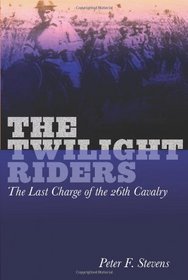While reading "The Leper Spy," about a brave Filipina woman who used her Hansen's Disease to frighten off Japanese soldiers who might have searched her for the vital information she carried, the 26th Cavalry was mentioned. This was a Philippine Scouts unit, still mounted on horses, which served as the main defensive unit during the retreat to Bataan at the beginning of World War II. I remembered I had "The Twilight Riders," a book about that unit in my TBR piles. So I picked it to read next.
This is a fascinating book which once again shows how Filipinos who served in U.S. Army units fought under unbelievable circumstances with their American officers against the Japanese. The story of their fight during the Japanese invasion and resistance against the Japanese occupation is one of the greatest stories of courage in history. It was also one of the bloodiest, as one of every 20 Filipinos died during that time.
The author really did his homework, as he covers not just the movements of the unit, but also the stories of the men from the commanding colonel to the lowest private, and even to their horses. He was fortunate to be able to interview several of these men. I wish I had been at his side when he interviewed former Lieutenant Edwin Ramsey. Ramsey escaped the surrender and went on to command 40,000 guerrillas fighting the Japanese on Luzon. I've read Ramsey's book, and he was one of the great American heroes of World War II.
Not many people know the Japanese suffered horrific loses in their conquest of the Philippines. In fact, if it hadn't been due to the lack of food and medical supplies for the American/Filipino army on Bataan, the battle for the Philippines might have turned out differently. But thanks to MacArthur and his staff, huge quantities of food and medical supplies were either left in Manila to be destroyed or captured by the Japanese. All MacArthur and his staff cared about was their safety. In fact, the author points out that MacArthur refused to allow any food to be sent to Bataan, until the caves on Corregidor Island were full. In one instance the author relates how just one huge warehouse full of rice, which was burned, would have provided food for the men on Bataan for a year.
When I was an officer in the Marines, I remember reading how U.S. Army General Omar Bradley once stated, "...amateurs talk strategy and professionals talk logistics." If you google that statement, you'll find that concept was known for over 2,000 years, as even Julius Caesar once said pretty much the same thing.
One interesting chapter toward the end of the book relates how Lieutenant Ramsey led the last horse-mounted cavalry charge against a Japanese unit. Later, when the surviving men of the 26th Cavalry had to turn over their horse to be shot for food for the army, the starving troopers of the 26th refused to eat any of the meat.
This is a fascinating book which once again shows how Filipinos who served in U.S. Army units fought under unbelievable circumstances with their American officers against the Japanese. The story of their fight during the Japanese invasion and resistance against the Japanese occupation is one of the greatest stories of courage in history. It was also one of the bloodiest, as one of every 20 Filipinos died during that time.
The author really did his homework, as he covers not just the movements of the unit, but also the stories of the men from the commanding colonel to the lowest private, and even to their horses. He was fortunate to be able to interview several of these men. I wish I had been at his side when he interviewed former Lieutenant Edwin Ramsey. Ramsey escaped the surrender and went on to command 40,000 guerrillas fighting the Japanese on Luzon. I've read Ramsey's book, and he was one of the great American heroes of World War II.
Not many people know the Japanese suffered horrific loses in their conquest of the Philippines. In fact, if it hadn't been due to the lack of food and medical supplies for the American/Filipino army on Bataan, the battle for the Philippines might have turned out differently. But thanks to MacArthur and his staff, huge quantities of food and medical supplies were either left in Manila to be destroyed or captured by the Japanese. All MacArthur and his staff cared about was their safety. In fact, the author points out that MacArthur refused to allow any food to be sent to Bataan, until the caves on Corregidor Island were full. In one instance the author relates how just one huge warehouse full of rice, which was burned, would have provided food for the men on Bataan for a year.
When I was an officer in the Marines, I remember reading how U.S. Army General Omar Bradley once stated, "...amateurs talk strategy and professionals talk logistics." If you google that statement, you'll find that concept was known for over 2,000 years, as even Julius Caesar once said pretty much the same thing.
One interesting chapter toward the end of the book relates how Lieutenant Ramsey led the last horse-mounted cavalry charge against a Japanese unit. Later, when the surviving men of the 26th Cavalry had to turn over their horse to be shot for food for the army, the starving troopers of the 26th refused to eat any of the meat.




